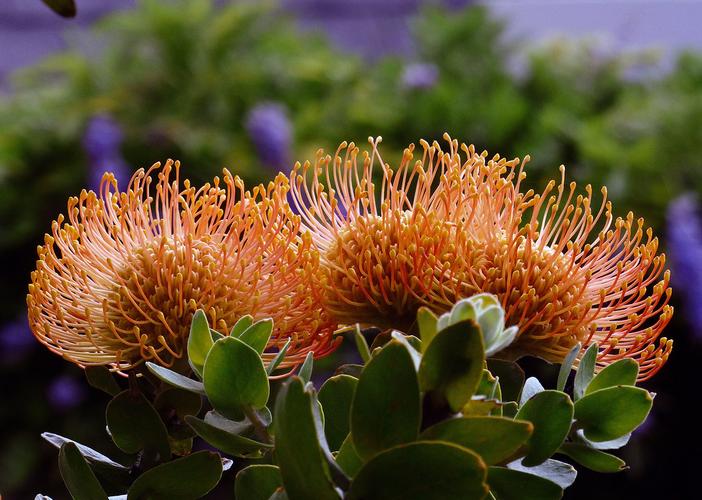Ornamental Pincushion
(Leucospermum cordifolium)
Ornamental Pincushion (Leucospermum cordifolium)
/
/

Bernard Spragg. NZ
CC0 1.0
Image By:
Bernard Spragg. NZ
Recorded By:
Copyright:
CC0 1.0
Copyright Notice:
Photo by: Bernard Spragg. NZ | License Type: CC0 1.0 | License URL: https://creativecommons.org/publicdomain/zero/1.0/ | Uploader: Bernard Spragg | Publisher: Flickr









































































Estimated Native Range
Summary
Leucospermum cordifolium, commonly known as Ornamental Pincushion or Bobbejaanklou, is an evergreen shrub from the Proteaceae family. It is native to the fynbos ecoregion, particularly the coastal mountains of the Western Cape province of South Africa, where it thrives in well-drained, sandy soils and is adapted to a Mediterranean climate with wet winters and dry summers. This shrub typically grows up to 1.5 meters (5 feet) in height and is noted for its striking flower heads, which are globe-shaped with a flattened top, measuring 10–12 cm (3.9–4.7 inches) in diameter. The flowers are a vivid orange-red color and are borne individually or in groups of two or three, mostly at right angles to the branch. Each flower head resembles a pincushion due to the long styles that stick out horizontally but curve upwards near the obliquely, shell-shaped, thicker pollen presenter. The flowering season extends from mid-July to the end of November, offering a long period of visual interest.
The Ornamental Pincushion is valued for its unique and showy flowers, making it a popular choice for cut flower arrangements and ornamental garden plantings. It is well-suited for rockeries, coastal gardens, and as a specimen plant in Mediterranean-style landscapes. It requires full sun to part shade, low water once established, and well-drained soils. While it is relatively low maintenance, it can be susceptible to root rot if overwatered or planted in poorly drained soils. It is also prone to fungal diseases such as Phytophthora. Cultivars and hybrids have been developed to offer a range of flower colors and sizes for garden use.CC BY-SA 4.0
The Ornamental Pincushion is valued for its unique and showy flowers, making it a popular choice for cut flower arrangements and ornamental garden plantings. It is well-suited for rockeries, coastal gardens, and as a specimen plant in Mediterranean-style landscapes. It requires full sun to part shade, low water once established, and well-drained soils. While it is relatively low maintenance, it can be susceptible to root rot if overwatered or planted in poorly drained soils. It is also prone to fungal diseases such as Phytophthora. Cultivars and hybrids have been developed to offer a range of flower colors and sizes for garden use.CC BY-SA 4.0
Plant Description
- Plant Type: Shrub
- Height: 8-11 feet
- Width: 8-10 feet
- Growth Rate: Moderate
- Flower Color: Yellow, Orange, Red
- Flowering Season: Spring, Winter
- Leaf Retention: Evergreen
Growth Requirements
- Sun: Full Sun, Part Shade
- Water: Low
- Drainage: Medium
Common Uses
Bee Garden, Bird Garden, Butterfly Garden, Deer Resistant, Hummingbird Garden, Salt Tolerant, Showy Flowers
Natural Habitat
Fynbos ecoregion, particularly the coastal mountains of the Western Cape province of South Africa
Other Names
Common Names: Red Pincushion-Protea, Bobbejaanklou
Scientific Names: , Leucospermum cordifolium, Leucospermum bolusii, Leucospermum nutans, Leucadendron cordifolium, Leucospermum mixtum, Leucadendron nutans, Leucospermum integrifolium, Leucospermum meisneri, Protea nutans,
GBIF Accepted Name: Leucospermum cordifolium (Salisb. ex Knight) Fourc.